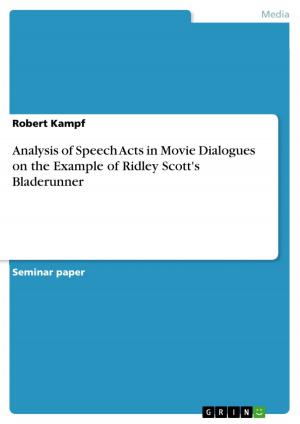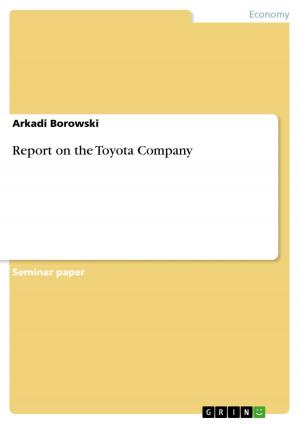| Author: | Stefan Krauss | ISBN: | 9783638299879 |
| Publisher: | GRIN Publishing | Publication: | August 13, 2004 |
| Imprint: | GRIN Publishing | Language: | English |
| Author: | Stefan Krauss |
| ISBN: | 9783638299879 |
| Publisher: | GRIN Publishing |
| Publication: | August 13, 2004 |
| Imprint: | GRIN Publishing |
| Language: | English |
Essay from the year 2004 in the subject Philosophy - Practical (Ethics, Aesthetics, Culture, Nature, Right, ...), grade: HD (High Distinction), Murdoch University (Institute for Sustainability and Technology Policy), course: Policy, Technology and Democracy, language: English, abstract: What does Winner mean when he says 'technologies are forms of life'? In his book 'The Whale and the Reactor', Langdon Winner introduces technologies as forms of life. With this notion, he tries to overcome 'our normal understanding of the meaning of technology in human life' (p. 12), which he declares as a 'widespread and ex-tremely narrow conception' (p. 12). Although it remains unclear about whom he refers to, the 'normal understanding' seems to be an understanding of technology as a 'cause-and-effect model' (p. 11), to which he attests 'empirical and moral shortcomings'(p. 11). Winner endeavours to explain the connection between technologies and the everyday life. What is needed is an interpretation of the ways, both obvious and subtle, in which everyday life is transformed by the mediating role of technical devices. (p. 9). Nowadays, technologies are so interwoven into the texture of everyday life that life is un-thinkable without them. At least for the western industrialized countries, it is valid that 'Humans must adapt. That is their destiny' (p. 10). Winner describes this situation as fol-lows: We do indeed 'use' telephones, automobiles, electric lights, and computers in the conventional sense of picking them up and putting them down. But our world soon becomes one in which telephony, automobility, electric lightning, and computing are forms of life in the most powerful sense: life would scarcely be thinkable without them. (p. 11) Originally, the expression 'forms of life' (Lebensform) came from the later Wittgenstein. By rejecting his earlier ideas of the 'Tractatus Logico-Philosophicus', in which he sketches 'language to be primarily a matter of naming things and events' (p.11), he stresses in the 'Philosophical Investigations' the mutuality of language and the circumstances, the sur-roundings, in which it is spoken or written. In this ordinary language philosophy, he takes into account that words, symbols, and sentences, which are woven into (speech-) acts, in the end are based on the concepts of the human living in all its different social, cultural, and in-terpersonal forms. Language is not seen as a 'non-spatial, non temporal phantasm' (PI, § 108), but as a 'spatial and temporal phenomenon' (PI, § 108) taking place in various language-games, which are overlapping and criss-crossing. ...
Essay from the year 2004 in the subject Philosophy - Practical (Ethics, Aesthetics, Culture, Nature, Right, ...), grade: HD (High Distinction), Murdoch University (Institute for Sustainability and Technology Policy), course: Policy, Technology and Democracy, language: English, abstract: What does Winner mean when he says 'technologies are forms of life'? In his book 'The Whale and the Reactor', Langdon Winner introduces technologies as forms of life. With this notion, he tries to overcome 'our normal understanding of the meaning of technology in human life' (p. 12), which he declares as a 'widespread and ex-tremely narrow conception' (p. 12). Although it remains unclear about whom he refers to, the 'normal understanding' seems to be an understanding of technology as a 'cause-and-effect model' (p. 11), to which he attests 'empirical and moral shortcomings'(p. 11). Winner endeavours to explain the connection between technologies and the everyday life. What is needed is an interpretation of the ways, both obvious and subtle, in which everyday life is transformed by the mediating role of technical devices. (p. 9). Nowadays, technologies are so interwoven into the texture of everyday life that life is un-thinkable without them. At least for the western industrialized countries, it is valid that 'Humans must adapt. That is their destiny' (p. 10). Winner describes this situation as fol-lows: We do indeed 'use' telephones, automobiles, electric lights, and computers in the conventional sense of picking them up and putting them down. But our world soon becomes one in which telephony, automobility, electric lightning, and computing are forms of life in the most powerful sense: life would scarcely be thinkable without them. (p. 11) Originally, the expression 'forms of life' (Lebensform) came from the later Wittgenstein. By rejecting his earlier ideas of the 'Tractatus Logico-Philosophicus', in which he sketches 'language to be primarily a matter of naming things and events' (p.11), he stresses in the 'Philosophical Investigations' the mutuality of language and the circumstances, the sur-roundings, in which it is spoken or written. In this ordinary language philosophy, he takes into account that words, symbols, and sentences, which are woven into (speech-) acts, in the end are based on the concepts of the human living in all its different social, cultural, and in-terpersonal forms. Language is not seen as a 'non-spatial, non temporal phantasm' (PI, § 108), but as a 'spatial and temporal phenomenon' (PI, § 108) taking place in various language-games, which are overlapping and criss-crossing. ...















